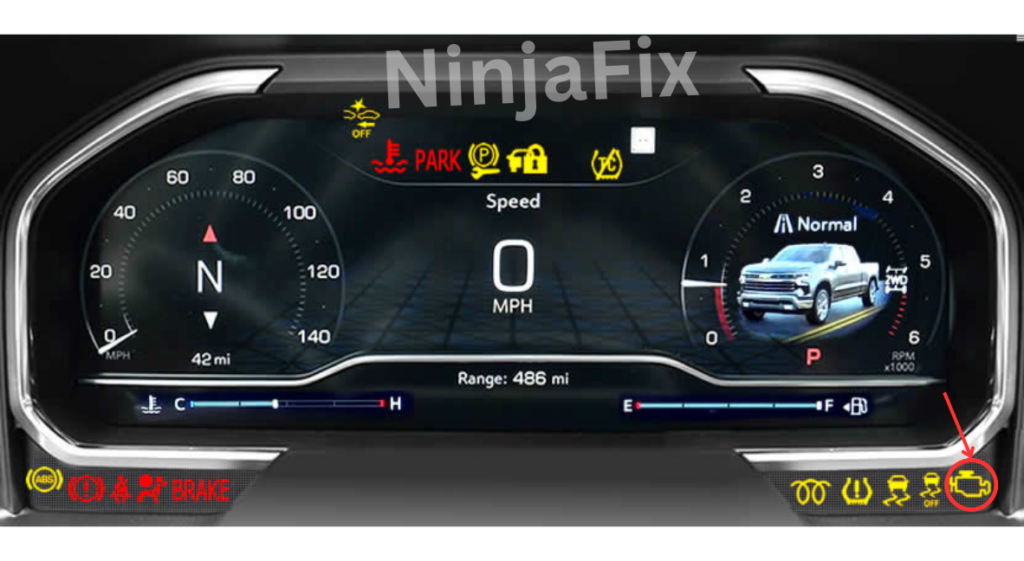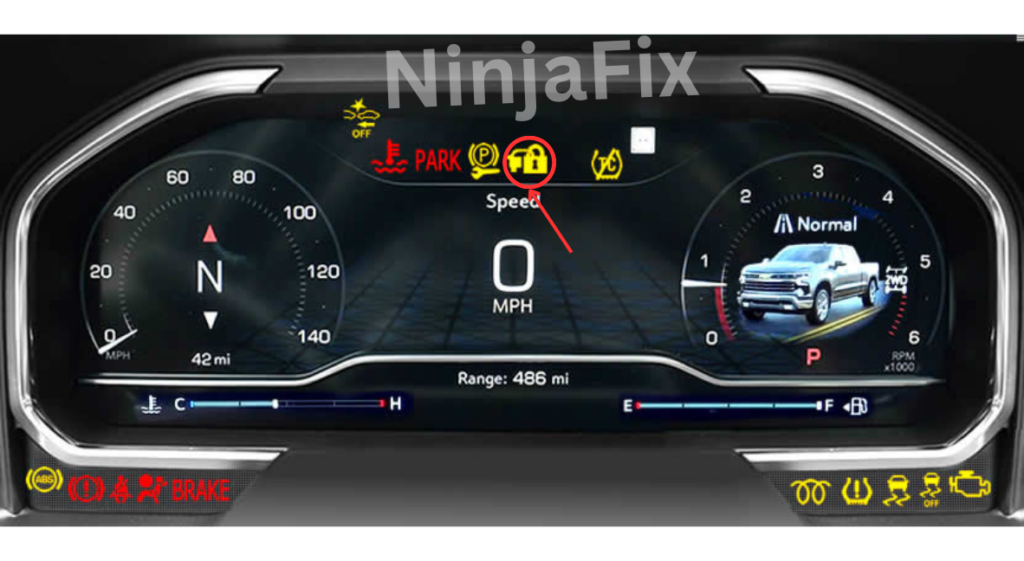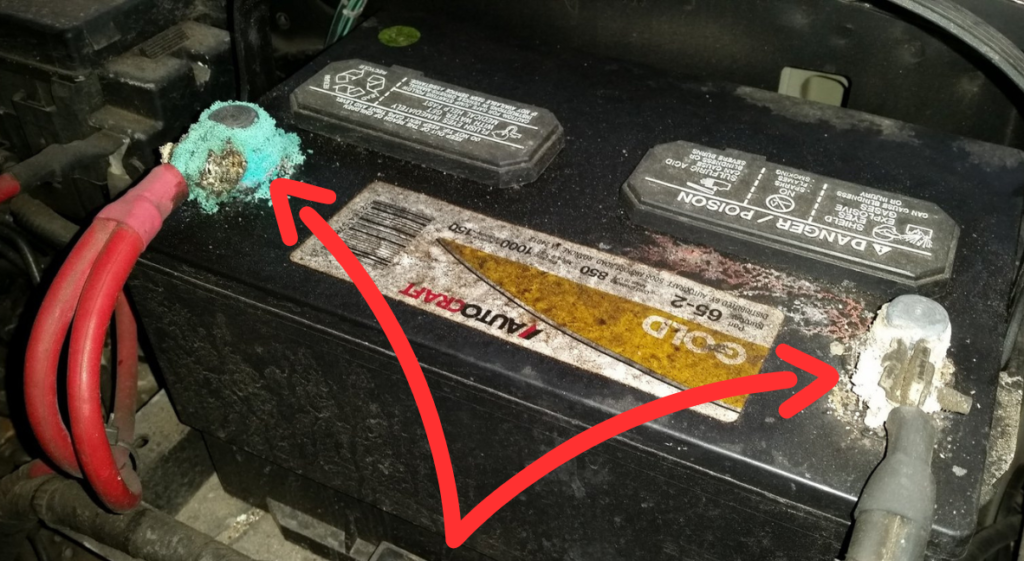When your GMC Sierra refuses to start, the underlying issue can often be determined by observing the symptoms it exhibits during the starting attempt. Typically, when the GMC Sierra won’t start, it exhibits two primary symptoms:
- Cranking But Won’t Start: In this case, the engine cranks but doesn’t actually turn over and start. This situation could indicate problems within the fuel system, such as issues with the fuel pump, fuel pump relay, or fuel pump fuse. Alternatively, it might be related to ignition problems, engine timing, fuel injector issues, or a faulty spark plug.
- No Cranking and Not Starting at All: This occurs when you turn the key, but the engine doesn’t make any noise, indicating a lack of cranking. Several potential reasons could be causing this issue, including faulty wiring, blown fuses, or other electrical issues, sensor malfunctions, a dead battery, bad battery cable terminals, or a faulty starter.
However, one potential silver lining is that if your GMC Sierra is not starting at all, there may be fewer factors to consider compared to if it were cranking or clicking but not starting. In any case, diagnosing the root cause of your GMC Sierra’s starting problems is an essential first step in getting your vehicle back on the road as soon as possible.
How To Diagnosis GMC Sierra’s starting Problems ?
The diagnosis and steps for resolving starting problems in the GMC Sierra can vary depending on the initial symptoms. If the engine is cranking but won’t turn over or if it’s not cranking at all, different steps and solutions may apply.
GMC Sierra Cranking But the Engine Does Not Start
There are several potential reasons why a GMC Sierra may crank but not start. These include issues with the check engine indication, fuel line system, ignition system, security system, and sensor malfunctions.
In the following discussion, we will explore possible solutions for each of these scenarios when a GMC Sierra’s engine is cranking but not starting.
1. Check Engine Indication

Diagnosis :
If your car is not starting, the first step is to turn on the key and check GMC Sierra’s dashboard for any warning lights. If the check engine light illuminates and remains on, it could indicate a problem within the check engine circuit that might be preventing the engine from starting.
Troubleshooting :
If GMC Sierra is cranking but not starting due to check engine circuit issue, you may need to check the fuse which protecting the air to fuel and fuel injector circuit.
If there is an issue with the check engine, it is recommended to check the fuse that protects the air-to-fuel and fuel injector circuit. A blown or faulty fuse in this circuit can prevent the necessary electrical power from reaching the components involved in the air-to-fuel ratio and fuel injection process.
To locate the air-fuel ratio and fuel injector fuse in the GMC Sierra fuse box diagram, refer to the fuse box’s manual or the back cover of the fuse box itself. Read the fuse box diagram for the fuse designation that corresponds to these components.
Then, check the fuse for any signs of being blown, such as a broken link or use a multimeter to test it. If the fuse is indeed blown, it will need to be replaced to resolve any issues related to the air-fuel ratio and fuel injector.
2. Security Engine Immobilizer

Diagnosis :
To check for a possible issue with the security immobilizer mechanism, turn the key to the ON position and look for the Engine Immobilizer Indication on the instrument cluster. The immobilizer indication should come on briefly and then go off. If the key symbol appears and stays on, the engine may crank but not start due to the security immobilizer mechanism.
Troubleshooting :
The immobilizer issue in your GMC Sierra could be caused by a faulty sensor in the key or a faulty lockset antenna. It may also be due to a blown fuse in the security system.
To diagnose the issue, first try starting your GMC Sierra with the second key. Often, the problem is caused by a faulty key sensor.
If the issue persists, check the fuse of the security circuit and see if it is blown. If it is blown, replace it.
If the issue still persists, it could be a problem with the lockset antenna or ECM. In this case, you should visit a service center for further assistance.
3. Fuel Supply
Diagnosis :
If GMC Sierra cranks or clicks but does not start, it could be due to a lack of fuel supply to the engine. To diagnose the problem, locate the fuel inlet line to the engine and open it. Then, crank the engine to check if fuel is coming out of the fuel line. If there is no fuel, there could be several reasons why fuel is not reaching the engine.
- Fuel Tank Level Low
- Fuel Pump Relay Malfunction
- Fuel Pump Fuse Blown
- Choke Inlet Fuel Filter
- Fuel Pump Malfunction.
Troubleshooting :
The troubleshooting of each problem is different and requires specific steps to identify and resolve.
Fuel Tank Level Low: If the GMC Sierra is cranking but not starting, it could be due to a low fuel level in the tank. Check the fuel level indicated in the instrument cluster. Sometimes, even if the instrument cluster shows a high fuel level, there may be low fuel in the tank due to a malfunction in the fuel level sensing system. To confirm the fuel level, check it manually in the tank.
Fuel Pump Relay Malfunction : To diagnose a possible malfunction in the fuel pump relay, locate the fuel pump relay in the fuse and relay box. Replace it with a similar relay, such as the radiator fan or AC relay, and check if the engine starts. If the engine starts, then the problem is likely with the fuel pump relay and it should be replaced.
Fuel Pump Fuse Blown : It is possible that there is no power supply to the fuel pump due to a blown fuse. Locate the fuel pump fuse on the fuse diagram located at the back side of the fuse and relay box cover. If the fuse is found to be blown, replace it with a fuse of the same amperage rating.
Choke Inlet Fuel Pump Filter : The inlet fuel pump filter can become clogged due to low quality fuel, which can prevent fuel from reaching the engine. To check this, locate the fuel pump filter and inspect it for any signs of clogging or blockage. If it is dirty, clean it thoroughly or replace it with a new one.
Fuel Pump Malfunction : If all of the above checks have been performed and there are no issues found, then the problem may be with the fuel pump itself. We recommend taking the GMC Sierra to a workshop or service center to have the fuel pump checked and replaced if necessary.
4. Ignition System
Diagnosis:
The ignition system ignites the fuel in the cylinder and starts the engine. If there is no ignition due to several reasons, the GMC Sierra will crank or click but won’t start. There could be several reasons for no ignition, such as:
- Bad spark plug
- Blown ignition coil fuse
Troubleshooting :
Each problem requires different troubleshooting steps.
Bad Spark Plug : If the problem is caused by a bad spark plug, you can check the current at the spark plug end using a current tester while cranking the engine for each cylinder. If there is no current detected, it may be due to a bad spark plug. In this case, the spark plug should be replaced.
Blown Ignition Coil Fuse : If the ignition fuse is blown, there may be no supply to the ignition coil, and as a result, there will be no ignition at the spark plug. Check the ignition fuse from the fuse and relay box and replace it with a new one of the same amperage if it is blown.
5. Faulty Position Sensor
Diagnosis:
If the crankshaft position sensor or camshaft position sensor is faulty, it can cause misfiring and prevent the engine from starting. These sensors are responsible for sending signals to the Engine Control Module (ECM) to determine the timing of the spark in each cylinder. If either sensor is not functioning properly, the timing may be off and the engine may not start.
Troubleshooting :
To diagnose an engine that won’t start due to misfire, check for any loose or cut wiring of the camshaft sensor and crankshaft sensor. If any issues are found, fix them and try starting the engine again. If the problem persists, the sensors may be faulty and need to be replaced.
GMC Sierra Not Cranking and Not Starting at All
If your GMC Sierra is not cranking or starting at all, the troubleshooting process is relatively simple.
The diagnosis and troubleshooting process may differ depending on the specific problem and the type of start system, whether it’s a push button start or a manual start.
1. Battery Cable Terminal
Diagnosis :

If your GMC Sierra is not cranking and not starting at all, a prime suspect is an electrical problem within the starting system. If there are carbon deposits on the battery terminal cables, it can prevent the electrical system from receiving power, leading to the GMC Sierra not cranking or starting at all.
Troubleshooting :
Ensuring that the battery terminals are clean and free from any corrosion deposits is crucial to maintaining a healthy electrical connection in your GMC Sierra. If you find any corrosion on the battery terminals, it’s necessary to clean GMC Sierra battery terminal properly while following safety precautions. Cleaning the corrosion from the battery terminals can resolve starting issues caused by electrical disruptions, allowing your GMC Sierra to start smoothly.
2. Dead Battery
Diagnosis :
When your GMC Sierra unexpectedly refuses to start, the primary suspect is often the battery. GMC Sierra batteries typically have a lifespan of 3-6 years. If your battery is approaching the end of its lifespan, it could be the cause of GMC Sierra not starting.
If the battery has reached the end of its lifespan, it is advised to replace it to avoid further issues.
How to Start a GMC Sierra When Battery is Low :
If your GMC Sierra isn’t starting due to a low battery, it’s essential to take action promptly. You can get your GMC Sierra starting with a low battery by jump-starting it or using the bump-start method.
You can perform a bump start on the GMC Sierra, but make sure there is someone in the driver’s seat to control the GMC Sierra.
Automatic transmissions do not have push-start capability, you can jump start the GMC Sierra with another vehicle’s battery, using jumper cables.
3. Faulty Alternator
Diagnosis :
If there is a fault in the alternator, it could lead to the GMC Sierra not starting. The alternator is responsible for charging the battery, and if it fails to do so, the battery will not have enough power to start the vehicle.
There are several signs that your alternator may be malfunctioning :
- Dim or over bright lights
- Dead battery
- Red Battery warning light ON
- Electric power fluctuates; features like power windows failing or flickering interior lights
- Whining noises coming from the alternator.
Troubleshooting :
If you suspect that the alternator is not functioning properly in your GMC Sierra, it is important to check the fuses and relays associated with the alternator before coming to the conclusion that it is faulty.
4. Starter Circuit
Diagnosis :
If the battery is charged but the engine is not cranking, then there may be a problem with the starter circuit.
The GMC Sierra’s starting circuit comprises several components that can potentially fail.
- Ignition Switch: If an ignition switch goes out, it won’t send the signal to the starter relay to engage when you turn the key to start. As a result, the GMC Sierra won’t crank, and it won’t start.
- Starter Relay: If a GMC Sierra exhibits symptoms of a bad starter relay, it may not crank at all because there’s no power supply to the starter motor. If you suspect the starter relay, test the relay for faults. If it’s found to be faulty, replace it with a similar non-essential relay.
- Starter Fuse: The starter fuse is specifically designed to safeguard the components within the starter circuit. If this fuse blows, it interrupts the circuit. To check if the starter fuse is blown, locate it and inspect its condition. If you find that it’s blown, replace it with a fuse of the same ampere rating.
- Starter Solenoid: The starter solenoid acts as a high-capacity switch that allows the starter to receive the high current required to start the engine. While the starter solenoid is a robust component, it’s essential to watch for any symptoms of starter solenoid issues.
- Starter Motor: If all the other components of the starter circuit are found to be functioning correctly, the issue may lie with the starter motor. A problem with the starter motor doesn’t necessarily mean that the entire starter assembly is faulty. It could be caused by non-contact between the carbon brush and the commutator due to wear and tear of the carbon components.
Simply replacing the carbon can solve the issue, and it is a cost-effective solution.
5. Dead Smart Key Battery
Diagnosis :
If the battery in the GMC Sierra smart key is low, the GMC Sierra may not start using the push button start.
Troubleshooting :
If the smart key battery is low, you can try holding the smart key closer to the push button or touching the push button with the smart key to start the GMC Sierra.
Replace the key battery as soon as possible.
